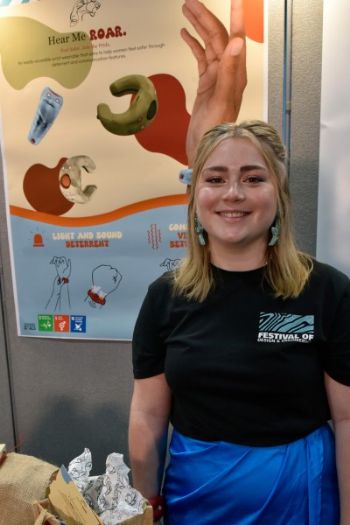
Over 100
Bournemouth University (BU) students demonstrated their inventions and prototypes at this year’s
Festival of Design & Engineering exhibition that took place on Talbot Campus on 21 and 22 June. The event, which was open to the public featured a whole range of products, including a wearable personal safety alarm, a portable device to help people with dysphagia prepare their food and an electric tractor. Many of the students’ final year projects on display address real-world issues such as environmental sustainability, improving people’s lives and tackling marginalisation.
Product design student Chloe Davey’s device, ‘Hear Me Roar’, is wrist wearable and designed to enhance a woman’s sense of security. Engineered for integration into daily life, the innovation features a strobe light, high-pitched siren and a communication function for exchanging reassuring vibrations between users. Her project aims to empower women in living their everyday lives and reduce feelings of isolation and vulnerability.
She said: “During my placement year in London, I felt scared walking from the tube to my flat, I felt like my independence was stripped from me as I was forced to rely on someone else for my own safety. After researching safety products, I saw the market was underdeveloped, which inspired me to design the device.”
Sophie Dorrington, also a product design student, created “Nutrify”, a portable food preparation device aiming to improve the lives of adults with dysphagia (difficulty swallowing), helping them prepare and heat their food wherever they are. Typically, preparing puréed food confines individuals with dysphagia to their homes. After seeing loved ones struggle with the condition and recognising how central food is to social situations, I was motivated to find a solution."
Introduced in 1992, the festival is one of the longest-running annual events in the Bournemouth University calendar. Design engineering student Archie Evan designed E-Tractor - a fully electric agricultural machine that features modular battery packs and high-performance electric motors, which recharge using solar power. His design aims to provide an affordable agricultural support for rural areas of sub-Saharan Africa, improving food security, quality of life and local economies. "Growing up on a dairy farm in rural Surrey, I have always had a passion for tinkering and coming up with ideas to make farming life easier.”
Archie continued: “With 80 to 90% of rural sub-Saharan farmers still relying on manual labour to cultivate land, more needs to be done to promote agricultural and economic growth. The E-Tractor aims to provide off-grid farmers with affordable access to modern farming technology, which can be used to increase farm efficacy and profits.”
Meanwhile, Lewis Broughton’s project aims to support sustainable consumption by reducing the amount of waste going into landfill from the footwear industry. “ModuRun” is a modular running shoe where each part can be replaced and recycled when they wear out, eliminating the need to buy a new pair and throw the old ones away. I have always been into shoes and after completing my placement year in footwear design it sparked a real interest in finding a way to innovate in an industry that hasn't changed the way footwear has been produced and used for many years.”
Other innovative products on display included: a device for emergency first responders to accurately monitor a casualty’s respiratory rate; an AI-powered device to detect fatigue in drivers; a product to reduce wind interference in hearing aids for cyclists; and a brake light for cyclists to warn cars behind them they are slowing.